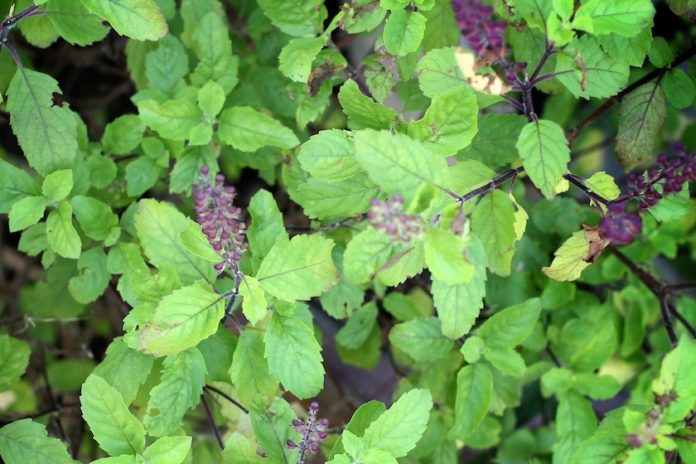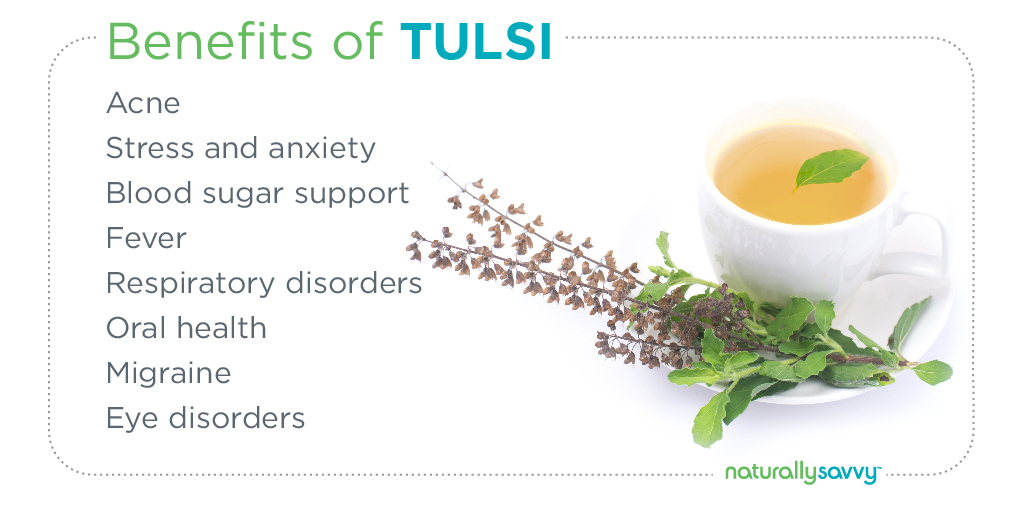
For approximately three millennia, people living in India have revered tulsi (Ocimum sanctum; also known as holy basil) as a therapeutic herb for a wide range of uses, especially in Ayurvedic medicine and tradition. Much more recently, researchers have provided scientific evidence to support the health claims, and this knowledge has served to widen the use of tulsi. Today it has been found to provide benefits to the cardiovascular system, central nervous system, gastric system, immune system, reproductive system, urinary system, and blood biochemistry, as well as help with insect and snake bites.
What is tulsi?
Tulsi is a perennial shrub that boasts purple-pink flowers, a lemon aroma, and oval-shaped leaves. The herb is believed to have originated in north central India, and today it is found naturally in tropical climates throughout the Eastern world. Two common types of tulsi include Rama tulsi, which has green leaves and white stems; and Shyam tulsi, which has pink-purple stems and leaves. Both types provide similar health benefits.
According to Ayurvedic tradition, tulsi “is said to prevent disease, promote general health, well-being and longevity, and assist in dealing with the stresses of daily life,” the latter quality of which places it in the category known as an adaptogen.
Health benefits of tulsi
Researchers have uncovered and verified a wide range of health benefits associated with the use of tulsi.
Acne and tulsi
If you or a loved one has acne, tulsi may come to your rescue. The main active ingredient in tulsi is eugenol, which is credited with fighting skin conditions such as acne.
Evidence of how holy basil, as well as sweet basil and hoary basil, can help with acne has been demonstrated in a lab study against bacteria associated with acne, Propionibacterium acnes. Tulsi oil works best for acne when combined with coconut oil as the carrier.
Read about 7 effective natural remedies for teen acne
Can tulsi help with stress and anxiety?
According to various reports, including one in the Journal of Ayurveda and Integrative Medicine, tulsi is an adaptogen, which means it “helps with the adaptation to stress and the promotion of homeostasis.” This is a critically important quality, as the herb can assist the body and mind in coping with various infectious, emotional, chemical, and physical stressors and work to restore balance in our often hectic lives. Drinking tulsi tea can help reduce stress and anxiety.
The threat of stress from industrial pollutants and heavy metals as well as physical challenges such as excessive cold, noise, and exertion can also be countered by tulsi. The herb has several phytochemical compounds that appear to be responsible for this trait: ocimumosides A and B (which may reduce levels of the stress hormone corticosterone; and 4-allyl-1lO-beta-D-glucopyronosyl-2-hydroxybenzene, which lowers stress.
Subscribe to our YouTube Channel.
Diabetes
For decades, scientists have recognized the anti-diabetic qualities of tulsi. In 1996, for example, individuals with non-insulin-dependent diabetes showed a decline in fasting blood sugar levels, after-meal sugar levels, urine sugar levels, and total cholesterol when they took holy basil in a placebo-controlled trial. Fast forward nearly two decades and the herb demonstrated an ability to significantly improve plasma insulin, insulin resistance, total cholesterol, high-density lipoprotein (HDL) cholesterol, low-density lipoprotein (LDL) cholesterol, and body mass index, all of which are important in individuals with diabetes.
Cancer
Various research efforts have indicated that tulsi may help prevent as well as treat certain cancers. For example, phytochemicals such as apigenin, beta-sitosterol, carnosic acid, eugenol, luteolin, myretenal, and rosmarinic acid, all found in tulsi, may help prevent oral, skin, and lung cancers because they boost antioxidant activity, help stop the spread of cancer, inhibit blood vessel growth that contributes to cancer cell growth, and induce cancer cell death, according to a study published in Nutrition and Cancer.
Fever
Tulsi has the ability to reduce fever, a use for the herb that is popular among those who practice Ayurvedic medicine. The powerful antimicrobial and disinfectant properties of tulsi help eliminate the pathogens that cause infections, which are typically accompanied by fever.

Respiratory disorders
Some of the components of tulsi, including camphene, cineole, and eugenol, can provide relief from respiratory congestion and other symptoms associated with breathing challenges. In a study published in the Indian Journal of Physiology and Pharmacology, the researchers noted that eugenol is largely responsible for the health benefits of the herb, including bronchitis and bronchial asthma.
Oral health
Daily brushing and flossing are highly recommended, and tulsi kills bacteria lurking in your mouth. Research also has shown that tulsi can halt the growth of oral cancer cells. You might consider adding tulsi essential oil to your toothpaste every day. The addition of tulsi tea to your everyday routine also can help with oral health.
Migraine
Treatment of migraines is challenging, which is one reason why the success of tulsi as a natural remedy for this severe headache is so important. Some investigators believe tulsi can relieve sinus pressure and recommend using the herb as a tea or in a diffuser to help relieve chronic pain.
Read about what to eat and what to avoid to soothe migraines
Eye disorders
Among the eye disorders, tulsi can help battle are pink eye (conjunctivitis) and cataracts. Tulsi can be applied in an eye drop preparation for these conditions. In the former case, tulsi works to reduce inflammation and provide soothing properties while in the latter, the use of tulsi plus turmeric has been shown to fight the oxidative stress and formation of proteins that result in cataracts.
Read next:
9 Ways to Boost Low Energy without Caffeine
7 Tips For Following An Ayurvedic Diet
Try These 6 Herbs to Clear Your Acne
DISCLAIMER: This article contains affiliate links, which means that if you click on one of the product links, Naturally Savvy will receive a small commission so we can keep pumping out amazing articles like this one. Thank you so much for your support!
Sources
Agrawal P et al. Randomized placebo-controlled, single blind trial of holy basil leaves in patients with non-insulin-dependent diabetes mellitus. International Journal of Clinical Pharmacology and Therapeutics 1996 Sep; 34(9): 406-9
Ahmad A et al. Novel Ocimumoside A and B as anti-stress agents: modulation of brain monoamines and antioxidant systems in chronic unpredictable stress model in rats. Phytomedicine 2012 May 15; 19(7): 639-47
Baliga MS et al. Ocimum sanctum L (holy basil or tulsi) and its phytochemicals in the prevention and treatment of cancer. Nutrition and Cancer 2013; 65 Suppl 1:26-35
Cohen MM. Tulsi—Ocimum sanctum: a herb for all reasons. Journal of Ayurveda and Integrative Medicine 2014 Oct-Dec; 5(4): 251-59
Gupta P et al. Constituents of Ocimum sanctum with antistress activity. Journal of Natural Products 2007 Sep; 70(9): 1410-16
Kumar KP et al. Traditional Indian herbal plants tulsi and its medicinal importance. Research Journal of Pharmacognosy and Phytochemistry 2010; 2(2): 93-101
Malhotra R et al. Comparison of the effectiveness of a commercially available herbal mouth rinse with chlorhexidine gluconate at the clinical and patient level. Journal of Indian Society of Periodontology 2011 Oct-Dec; 15(4): 349-52
Prakash P, Gupta N. Therapeutic uses of Ocimum sanctum Linn (tulsi) with a note on eugenol and its pharmacological actions: a short review. Indian Journal of Physiology and Pharmacology 2005 Apr; 49(2): 125-31
Satapathy S et al. Effect of tulsi (Ocimum sanctum Linn) supplementation on metabolic parameters and liver enzymes in young overweight and obese subjects. Indian Journal of Clinical Biochemistry 2017 Jul; 32(3): 357-63
Singh A. Haldi, tulsi can fight cataract. The Times of India 2003 Nov 8
Viyoch J et al. Evaluation of in vitro antimicrobial activity of Thai basil oils and their micro-emulsion formulas against Propionibacterium acnes. International Journal of Cosmetic Science 2006 Apr; 28(2): 125-33










